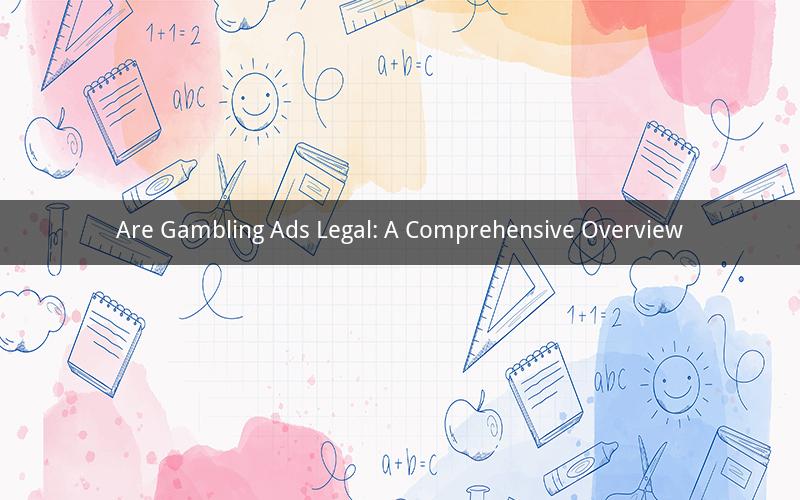
Introduction:
The world of gambling has seen a significant rise in popularity over the years, and with it, the advertising industry has also expanded. With the advent of the internet and social media, gambling ads have become more accessible than ever. However, the legality of these ads remains a topic of debate. In this article, we will delve into the various aspects of gambling ads and their legal status.
1. The Legal Landscape of Gambling Ads:
Gambling ads are subject to different regulations depending on the country or region. While some countries have strict laws against gambling ads, others have more lenient policies. Here's a breakdown of the legal landscape in some key regions:
a. United States:
In the United States, the legality of gambling ads varies from state to state. The Federal Communications Commission (FCC) has the authority to regulate broadcast advertisements, while the Federal Trade Commission (FTC) oversees online advertising. Some states, like Nevada and New Jersey, have more relaxed regulations, while others, such as New York and Massachusetts, have stricter laws.
b. United Kingdom:
The United Kingdom has a comprehensive regulatory framework for gambling ads. The Gambling Commission is responsible for overseeing the industry, including advertising. Gambling ads are required to comply with specific standards, such as not targeting minors and providing clear information about the risks involved.
c. Australia:
In Australia, the Interactive Gambling Act 2001 regulates online gambling and advertising. The Act prohibits online gambling ads from targeting Australian residents and requires advertisers to comply with certain guidelines, such as ensuring that the ads are not misleading or deceptive.
2. The Challenges of Regulating Gambling Ads:
Regulating gambling ads presents several challenges for authorities. Here are some of the key issues:
a. Cross-border Advertising:
With the internet, gambling ads can easily cross borders, making it difficult for authorities to enforce regulations. This has led to concerns about the potential for increased problem gambling in certain regions.
b. Targeting Minors:
One of the main concerns regarding gambling ads is the potential for minors to be exposed to them. Authorities must ensure that advertising is not targeted at this vulnerable group and that appropriate measures are in place to prevent underage gambling.
c. Misleading and Deceptive Ads:
Gambling ads often contain claims that may be misleading or deceptive. Authorities must monitor these ads closely to ensure that they provide accurate information about the risks and odds involved in gambling.
3. The Role of Self-Regulation:
In addition to government regulations, the gambling industry has implemented self-regulatory measures to address concerns about advertising. Here are some of the key initiatives:
a. The European Gaming and Betting Association (EGBA):
The EGBA has developed a self-regulatory framework for gambling advertising in Europe. The framework includes guidelines on responsible advertising, targeting, and content.
b. The American Gaming Association (AGA):
The AGA has established a code of conduct for responsible gambling advertising in the United States. The code aims to ensure that advertising is accurate, fair, and does not encourage problem gambling.
4. The Impact of Legalizing Gambling Ads:
Legalizing gambling ads has both advantages and disadvantages. Here's a closer look at both sides:
a. Advantages:
- Increased tax revenue for governments
- Enhanced consumer protection through regulation
- Increased transparency in the gambling industry
b. Disadvantages:
- Potential for increased problem gambling
- Negative impact on public health and well-being
- Misleading and deceptive advertising practices
5. The Future of Gambling Ads:
The future of gambling ads remains uncertain, but several trends are shaping the industry:
a. Technological Advancements:
Advancements in technology, such as artificial intelligence and machine learning, will likely impact the way gambling ads are targeted and delivered.
b. Changing Regulations:
Regulatory frameworks for gambling ads are likely to evolve as new challenges arise and as public opinion shifts.
c. Increased Focus on Responsible Gambling:
As problem gambling continues to be a concern, there will likely be a greater emphasis on responsible gambling initiatives, including advertising.
Conclusion:
The legality of gambling ads is a complex issue that varies by region. While some countries have strict regulations, others have more lenient policies. As the industry continues to grow, authorities and the industry itself must work together to ensure that gambling ads are responsible, transparent, and do not contribute to problem gambling.
Questions and Answers:
1. Q: Can gambling ads be targeted at minors?
A: No, gambling ads are generally prohibited from targeting minors. Authorities require advertisers to implement measures to prevent minors from being exposed to these ads.
2. Q: Are online gambling ads regulated differently from broadcast ads?
A: Yes, online gambling ads are often subject to different regulations than broadcast ads. Online ads may be subject to stricter regulations, especially in terms of data protection and privacy.
3. Q: Can gambling ads be misleading or deceptive?
A: Yes, gambling ads can be misleading or deceptive. Authorities monitor these ads closely to ensure that they provide accurate information about the risks and odds involved in gambling.
4. Q: What role does self-regulation play in the gambling industry?
A: Self-regulation plays a significant role in the gambling industry, helping to address concerns about advertising and responsible gambling. Industry associations and organizations develop codes of conduct and guidelines to ensure that advertising is responsible and transparent.
5. Q: How do technological advancements impact gambling ads?
A: Technological advancements, such as artificial intelligence and machine learning, can impact gambling ads by enabling more targeted and personalized advertising. However, these advancements also raise concerns about privacy and data protection.